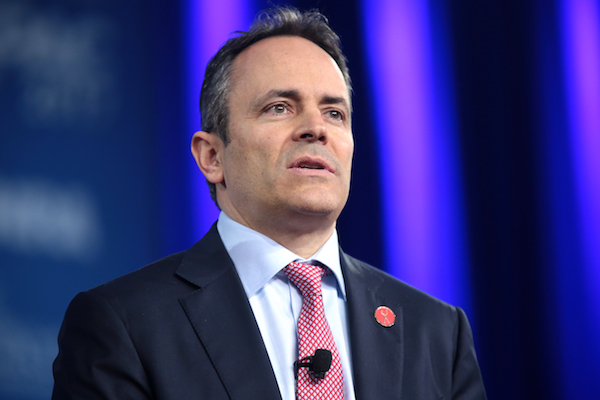
Credit: Gage Skidmore
The Freedom From Religion Foundation is taking a dim view of a new Kentucky gubernatorial initiative.
Gov. Matt Bevin is touting an unconstitutional plan to combat rising violence in Louisville: prayer walks. Announcing this irresponsible strategy recently, he said:
The lieutenant governor and myself laid forth a very simple request to people, and I’ll share with you what that is: It is harnessing people of faith to pray for the community, engage with the community by physically walking blocks in that community, praying for the community, for the people in those communities, and engaging with them. . . . We ask people to spend no more than 30 minutes moving around the block. Go around the block, pause on each corner, pray for the people there, move to the next corner.
Bevin has said that this plan “costs nothing,” but substituting prayer for action could cost lives. Instead of a concrete solution, Bevin is asking people to engage in useless wishful thinking. His use of his secular public office to promote prayer is also an abuse of power. But compounding the insult to our Constitution is the injury to citizens who deserve a rational government that will actually take action to solve problems, or at least not stand in their way. And Bevin’s proposal runs into constitutional roadblocks.
“It is a fundamental principle of Establishment Clause jurisprudence that the government cannot in any way promote, advance or otherwise endorse religion,” FFRF Co-Presidents Dan Barker and Annie Laurie Gaylor write to Bevin. “It is unconstitutional and inappropriate for government officials to use their government office to advance, promote or endorse one religion over another, or religion over nonreligion. You must keep your religion to yourself when acting in your official capacity.”
In 1993, FFRF won an injunction against the mayor of Denver over his promotion, endorsement and sponsorship of a “Day of Prayer.” Government officials can worship, pray and participate in religious events in their personal capacities. But they are not permitted to use their government office to organize prayer walks. Their office and title belong to “We the people,” not the office’s temporary occupant.
There are other problems with Bevin’s approach. Apparently, he believes that prayer will lower crime. But this is simply not true. The walks themselves may lower crime at the time simply by having crowds on the streets, but that is not because of the power of prayer — it is the power of people. Prayer cannot stop violence.
Studies have shown that societies with less prayer have less violence, FFRF points out to the governor, with documented sources. In fact, when any given factor of societal health or well-being is measured, invariably the less religious countries score better. The correlation of lower religiosity with higher societal well-being also exists within United States. Those states that are the most religious have a high occurrence of societal ills.
To avoid the constitutional concerns and the divisiveness this program will cause within the community, the solution is simple, FFRF says: Bevin should discontinue using his official office to promote his personal religion.
“Pious politicians should get off their knees and get to work,” state Barker and Gaylor. “A politician who beseeches a supernatural force to do his job for him is in the wrong profession.”
The Freedom From Religion Foundation is the largest freethought association in North America, with more than 29,000 members and chapters all over the United States, including membership and a state chapter in Kentucky. FFRF protects the constitutional separation of state and church and educates the public on matters relating to nontheism.

